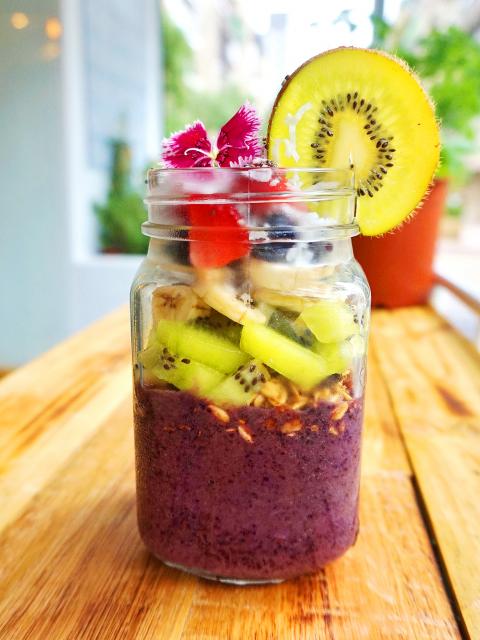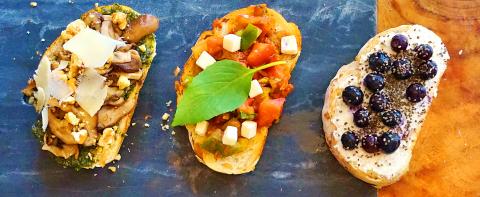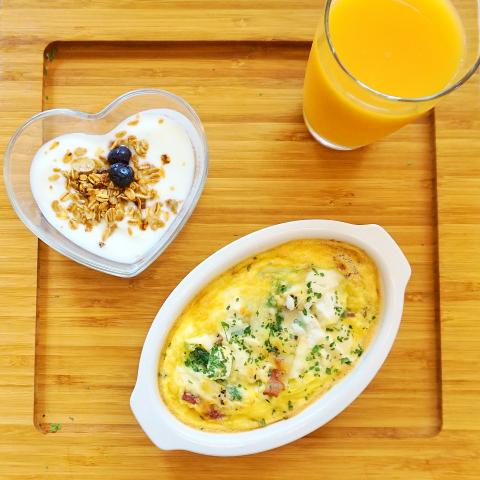Acai. Cultivated from the Brazilian Amazon, the berry was wildly popular among health-conscious yogis and runners in US cities like New York and San Francisco more than five years ago. The craze didn’t quite reach Asia, but a new haunt in Taipei is seeking to change this.
Tucked in a quiet alley minutes from the madness of Zhongxiao Fuxing MRT and furnished high and low with plants — plants in burlap sacks, plants in pots, plants in tabletop vases — Yucca Cafe makes it known that it’s all about the zen lifestyle. And, of course, acai. The menu includes a lengthy description of the super fruit, from cultivation methods in the Amazon Rainforest to the types of properties acai contains — iron, calcium, fiber, Vitamin A and lots of antioxidants. In other words, it’s very, very healthy.
The cafe is the brainchild of co-founder Fabio Grangeon. The Frenchman may be a TV show host, model and surfer (he spent part of his childhood in the Caribbean) but his dream has always been to open a restaurant. He started cooking when he was a child, helping his grandparents in the kitchen of their restaurant in Toulouse, and then working at Daylesford Organic in London’s Notting Hill in his late teens.

Photo: Dana Ter, Taipei Times
Moving to Taiwan five years ago to study Chinese, Grangeon says that he wasn’t exactly enamored by night market offerings. He often found himself eating sandwiches at Subway to get at least a few slices of lettuce in his diet. Fortunately, the last two years has seen the proliferation of more health-conscious cafes, making it much easier for him to maintain a healthy lifestyle.
Bits of Grangeon’s sensibility are interspersed throughout the cafe. Outside is a mini garden with lavender, basil and olives, and a little fountain — for fengshui — set against a blue-tiled walled that evokes southern France. The ceiling lights and mirror frames he carved from driftwood gathered from the beaches in Yilan.
Grangeon met Brazilian Tordan Ferreira while studying at Ming Chuan University, and earlier this year, the duo launched Purple Passion, a freeze-dried powder imported from Brazil and sold in Taiwan to use in acai juice and smoothies — the project was the prelude to Yucca Cafe.

Photo: Dana Ter, Taipei Times
Never mind the hefty price (NT$310), order the Acai Jar. Purple Passion powder is mixed with banana, almond milk, honey and acai fruit to create a luscious and refreshing drink with hints of natural sweetness. This is topped with kiwi, bananas, strawberries and granola. The trick is to mash it all up for the flavors (sweet, savory) and textures (soft, crunchy) to blend.
This is well complemented with the Yucca Toast (NT$380), a choice of three types of sweet or savory toast with toppings. One of my biggest peeves when it comes to bread is that it’s too dry or too hard, but the homemade whole wheat bread is superb.
From the sweet section, I opt for the ricotta, berries and chia seeds. The juiciness of the acai berry provides a pleasant contrast with the ricotta cheese, one of the milder types of cheese, and according to Grangeon, its chosen to suit local palates. Dribbled onto the toast, the chia seeds — not an easy to find ingredient — provide a little crunch and texture.

Photo: Dana Ter, Taipei Times
I also sample the homemade pesto, grilled mushroom, parmesan cheese and nuts from the savory section. The basil and olive oil are highly discernible in the pesto sauce, my favorite component of the toast. The grilled mushrooms are succulent, the parmesan cheese, thinly shredded is delightfully nutty though the nuts themselves — sprinkled atop the toast — are a little too sweet.
For my third toast, I choose the homemade dry tomatoes, basil jam and mozzarella, another savory option. Like the other two, flavor and texture are understated but sublime. It’s hard to go wrong with a dried tomatoes and mozzarella pairing, and the basil jam, another luscious taste, and also vaguely Mediterranean, is pleasantly herbal and savory.
The Acai Jar and Yucca Toast are both served all day. When it comes to ordering other food, it gets a little more confusing, as different dishes are served for brunch (10am to noon), afternoon tea (2pm to 5pm) and for lunch (noon to 2pm) and dinner (6pm to 8pm). Grangeon says this might change, and for now, it’s because they need to prep the veggies — all sourced from farmers in Yilan, Pingtung and Nantou — in the morning for the lunch and dinner menu.
Unfortunately, I arrive too early to order lunch. I had my eye on the Farmer Stew Beef (NT$380) because I can never say no to brisket and the Yucca Quinoa Salad (NT$360), quinoa being another rare ingredient. So I settle for the Healthy Frittata brunch set (NT$430). This is served with a choice of beverage (I pick orange juice) and a dessert (I opt for the yogurt granola).
The frittata, which consists of eggs, tomatoes, spinach, tofu, cheese and bread, isn’t as memorable as the Yucca Toast, but it’s still remarkably tasty and goes with Yucca’s ethos of packing in all the nutrients you need in a small, basic meal. I normally prefer much larger portions (this is coming from someone who can eat two briskets in one seating) but the frittata set is good for a pre-workout meal for the more health-conscious. Still, Yucca is all about the acai — order anything with acai and you can’t go wrong.

Towering high above Taiwan’s capital city at 508 meters, Taipei 101 dominates the skyline. The earthquake-proof skyscraper of steel and glass has captured the imagination of professional rock climber Alex Honnold for more than a decade. Tomorrow morning, he will climb it in his signature free solo style — without ropes or protective equipment. And Netflix will broadcast it — live. The event’s announcement has drawn both excitement and trepidation, as well as some concerns over the ethical implications of attempting such a high-risk endeavor on live broadcast. Many have questioned Honnold’s desire to continues his free-solo climbs now that he’s a

Lines between cop and criminal get murky in Joe Carnahan’s The Rip, a crime thriller set across one foggy Miami night, starring Matt Damon and Ben Affleck. Damon and Affleck, of course, are so closely associated with Boston — most recently they produced the 2024 heist movie The Instigators there — that a detour to South Florida puts them, a little awkwardly, in an entirely different movie landscape. This is Miami Vice territory or Elmore Leonard Land, not Southie or The Town. In The Rip, they play Miami narcotics officers who come upon a cartel stash house that Lt. Dane Dumars (Damon)

Francis William White, an Englishman who late in the 1860s served as Commissioner of the Imperial Customs Service in Tainan, published the tale of a jaunt he took one winter in 1868: A visit to the interior of south Formosa (1870). White’s journey took him into the mountains, where he mused on the difficult terrain and the ease with which his little group could be ambushed in the crags and dense vegetation. At one point he stays at the house of a local near a stream on the border of indigenous territory: “Their matchlocks, which were kept in excellent order,

Today Taiwanese accept as legitimate government control of many aspects of land use. That legitimacy hides in plain sight the way the system of authoritarian land grabs that favored big firms in the developmentalist era has given way to a government land grab system that favors big developers in the modern democratic era. Articles 142 and 143 of the Republic of China (ROC) Constitution form the basis of that control. They incorporate the thinking of Sun Yat-sen (孫逸仙) in considering the problems of land in China. Article 143 states: “All land within the territory of the Republic of China shall